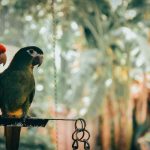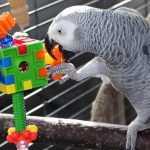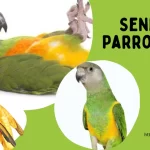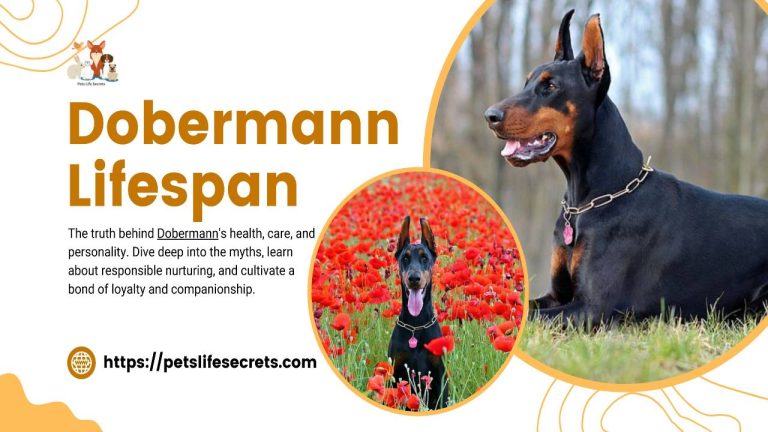Discover the key elements of optimal Senegal Parrot care and learn how to nurture a well-rounded clown bird. This comprehensive guide provides essential tips, from nutrition and behavior to training and enrichment, ensuring a healthy and happy parrot companion. Unlock the secrets of successful parrot care today
The Senegal Parrot is one of the most complete companion birds you can find in a pet store, which in addition to having a lower price in the pet trade, brings together many of the qualities that make other breeds so well known and loved by bird lovers as the Macaw, African Grey Parrot, Cockatiel or others parrot species.
The Senegal parrot has been compared to the latter, the Grey, thanks to its intelligence and personality that can come to have a preference for a single person or owner among the whole family. Fortunately for you, it is something you can avoid but only if you have proper management and follow the guidelines and advice that can give you the experts in this area such as the breeders of Senegal Parrots or an avian veterinarian. So, if this species of bird is so well known, easy to breed and manage, what will be the reason why it does not become as popular as other parrots?
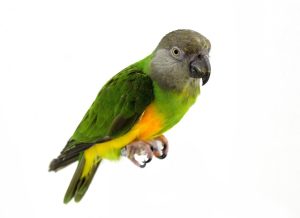
Table of Contents
DESCRIPTION OF SENEGAL PARROT
Like other parrot breeds, Senegal comes from the woodlands of Africa, where it was named after its natural habitat. This African parrot belongs to the group of the Poicephalus, being the most known and popular under the name of Poicephalus senegalus among the 10 species within this group. The Senegal Parrot is small to a medium-sized bird, reaching 10 inches at maturity and weighing between 4.5 to 6 ounces (150 grs on average).
It is a bird with a lot of similarity to the great majority of the parrots, having had a short tail and a big beak for what it was placed in this category. There is no difference between the male and the female so they are considered a monomorphic species, if you want to know the sex of your pet you will have to do a DNA test. The rest of his body is a set of several shades that help him to look better than other birds in conjunction with his great personality. When they are young their colors are not so bright and some have different tonalities.
For example, the head has a brown shade and a fading gray along with dark eyes between black and brown. When they are adults, they take a gray head color by which in great part they are so distinctive, leaving the rest of the body with vivid colors between green, yellow, and orange. The back and throat are green, where the neck/throat has a “V” shape that reaches to the chest, leaving the rest of the body with a yellow vest to orange coloring.
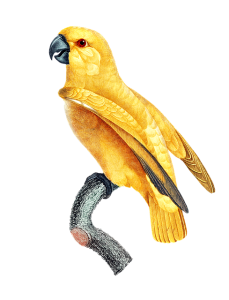
The beak remains gray as the head and its eyes have a yellow iris that stands out in the head. Its average life span is between 20 and 30 years, but there are owners who claim to have had their Senegal Parrot up to 50 years, but this will depend on the care and attention you can get to give it.
SENEGAL PARROT PERSONALITY
Intelligent, loyal, sociable, entertainers, full of life, affectionate, quiet and calm, are one of many things you will find in this excellent pets and why they are so extraordinary and easy to breed. In the wild, the wild parrots like the Senegal Parrot are always in flocks, so you should try to keep it in a family environment or accompanied, allow it to be with you as long as possible to avoid problems with his personality and not create a sense of extreme captivity.
Even though it has such special qualities that many people look for in a bird besides having a convenient size, unlike other parrots that can be a problem because of their scandal and their size, the problem with the Senegal Parrot is the attention they demand. They may not reach the extreme of a Cockatoo but it is something you should take into account when adopting it.
Another thing you must take into account is that even though they are excellent with people and to handle them, you should not leave them with children because if they get upset or stubborn when they do not get something they want they can become problematic or aggressive.
They have a good reputation for their ability to reproduce sounds, either by talking or whistling, but as I said before, they are not some kind of scandalous bird nor do they make such annoying noises as some parrots do. This is something that your neighbors will thank you for since with this pet parrot you should not have any problem, because they are calm and quiet in spite of this quality.
But you must be careful with the noises in the household because there are some owners who have commented that they usually reproduce sounds of phones or the beep of the microwave. Being a smart bird often learn sounds and words with some ease but do not get to have such a large repertoire despite it. They love to be with their owner, so you should be comfortable having your pet on your shoulder or in your hand for certain periods of time. This is a bit of a tricky subject and is something I strongly recommend you to be very careful about adopting into your Senegal Parrot.
First of all, you should look for one that looks cheerful, active, and with its shiny plumage in good condition, not a bird that may well be a little off the flock, possibly with breath sounds and some unruly feathers as these are usually signs of a sick bird. Of course, you could adopt a pet bird with the described characteristics of a sick bird in case you have the capacity to invest in vet bills to help it and provide it with a quality of life that all pets and animals deserve, something that very few people actually do and their new companions will thank them for all their lives.
Following this, you should talk to the breeder or check that in the information described on the internet or from where you got the contact of a breeder of Senegal Parrots, that they have been hand-raised as this will promote their social side and will be easier to handle at home.
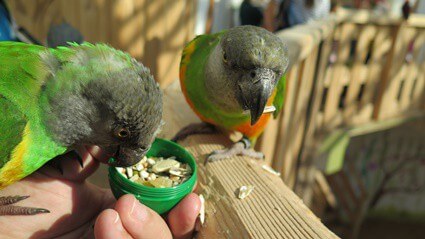
This is something you will find in most articles or guides of other bird species and this is because from an early age they get used to being in contact with people so they will not have a bad experience at home in case it is done in an abrupt way. As I usually mention, you must understand the needs and limitations of each pet to adapt to them, do not force your pet to get used to an environment that does not go with its nature and personality.
Relating to your Senegal parrot from the beginning is something more than fundamental and that both the avian veterinarian and the breeder can come to recommend you since they can be loyal and affective with people, have a reputation for adopting this attitude with only one person in the family or they are called “one-person bird”, which is not ideal for a family environment.
If everyone in the home agrees and is willing to commit to this task and everyone socializes and shares with your Senegal parrot and avoids being attached to only one person. It may be a tedious task but it is something you must do and it really is a small part or portion of their personality for all that you will get in return by giving them everything they need to lead a full and healthy life.
SENEGAL PARROT CARE & HEALTH
Something that will help you keep this feathered comedian happy is the chewable toys, something that is very common among the Parrot breed that seeks to bite what they can since they are a bit curious. In case the Senegal parrot is a very playful and active bird so you should always provide a toy that is recommended by the vet ensuring that it is not a material that ends up hurting your bird. Like perches, toys can be found in pet stores and it is best to have a good arsenal at home to be prepared for any case that may arise.
For the cage of your Senegal is important that you do not get carried away by its size, may well be a small parrot but as long as it is the largest you can get better will be for your pet. In case you have doubts about it I invite you to read my article on care and management of pet birds where I talk a little more in detail about these aspects that I mention about everything you should take into account to be a good if not the best avian owner.
Summarizing a little of what I get to talk about in this article, you must ensure that you have an ideal position for the cage of your Senegal parrot that is in a place that is not harmful because the birds are often sensitive to many things that people tend to overlook. The quality of the cage is important because if it is made of a material that your bird can damage or break with some ease could be a problem in the future because there are things in the house that are dangerous for any bird.
Something I recommend in terms of the cage is that it is one where you can remove the bottom or where all the droppings fall from your Senegal to make it easier for you to clean and not have to bother your bird so much to perform this task. The products you use to clean the cage, in general, should not be harmful or leave residues that may well affect your bird in the long run.
Creating a strong bond with all family members at an early age will help to clean the cage or move something inside it is not a bad experience for your bird, because if the bird is not used to be so close to certain people or if it does not accept that some family members are so close to it could become agitated and bring some stress problems as often reflected in the feather plucking for example. You should always keep filtered water available in a clean container every day.
The food container must also be kept clean not only for hygiene in general but also so that you can keep your food looking good so that they do not get bored with it or take it in a bad way as it would not be ideal in the long run. The cage should be cleaned periodically and everything will depend on the number of birds you have. The time they spend outside the cage you must be alert and ensure that it is in an area of the house where your bird is not in danger and keep everyone aware that your bird will be out of its cage to avoid any unnecessary accidents.
Now, on their diet, the Senegal parrot feeds on seeds, fruits, and flowers in the wild, so you should look for foods that are of their preference. Something that is very important and many people tends to overlook and neglect the nutritional and general feeding of their birds without knowing the great risk they run in doing this and how much it harms their pets.
Although birds tend to suffer some diseases due to a deficiency or excess of some nutrients due to bad feeding and bad management by their owner. A routine check-up with your vet will help you detect any problems in this regard but it is something you can avoid by following some very simple rules and steps.
The seeds are not sufficient nor do they bring as many nutrients as to base your bird’s diet on this alone. There are formulated foods or concentrates that already bring everything necessary for your bird but you should not use only this type of food, you can vary it with what I mentioned before to vary a little their menu throughout the day to take advantage of both the seeds and the fruits as an appetizer.
Concentrated food should be 75% to 80% of your bird’s daily diet, leaving room for the rest. Always consult with your avian veterinarian before changing anything in this aspect and any other in general to avoid any problem with your pet. Even though nowadays the internet is full of a lot of information, it is recommended that you go directly to your most reliable source of information such as a veterinarian.
Among the diseases that are commonly seen in Senegal parrot is the Aspergillosis, a disease produced by a fungus, so it is important to maintain the environment of your bird with the best relative humidity and ideal as well as a non-stress environment that can predispose it to suffer both this and many other diseases. Another disease that is common in this bird is Bornavirus (PDD) that is usually related to its feeding and corporal structure.
By knowing all the aspects of your pet it will be easier for you to identify this type of problem in time to avoid them reaching an advanced stage complicating the overall picture. Not only should you maintain a good relationship and communication with your Senegal parrot, but you should also create one with your vet who will help you keep your bird in an optimal state of health and will help you with certain aspects of its care or handling such as grooming that includes the trimming of its beak, claws, and feathers in case it is necessary at the time of your visit.
Click Here For: Burmilla Cat Breed
The Senegal parrot is more than an extraordinary bird but it is not made for every family environment or person. They may well be full of many benefits thanks to a personality that makes them easy to handle, but they are usually delicate with the social part which is almost the only thing you will have to worry about during their time in your care.
They have beautiful colors in their plumage and will certainly give you and your family a good time by being humorous and active. Make sure you have everything ready before you take a Senegal bird home for everyone’s sake and when you adopt it is best to take it to a vet to start this routine as soon as possible so that it can get used to the whole experience.












